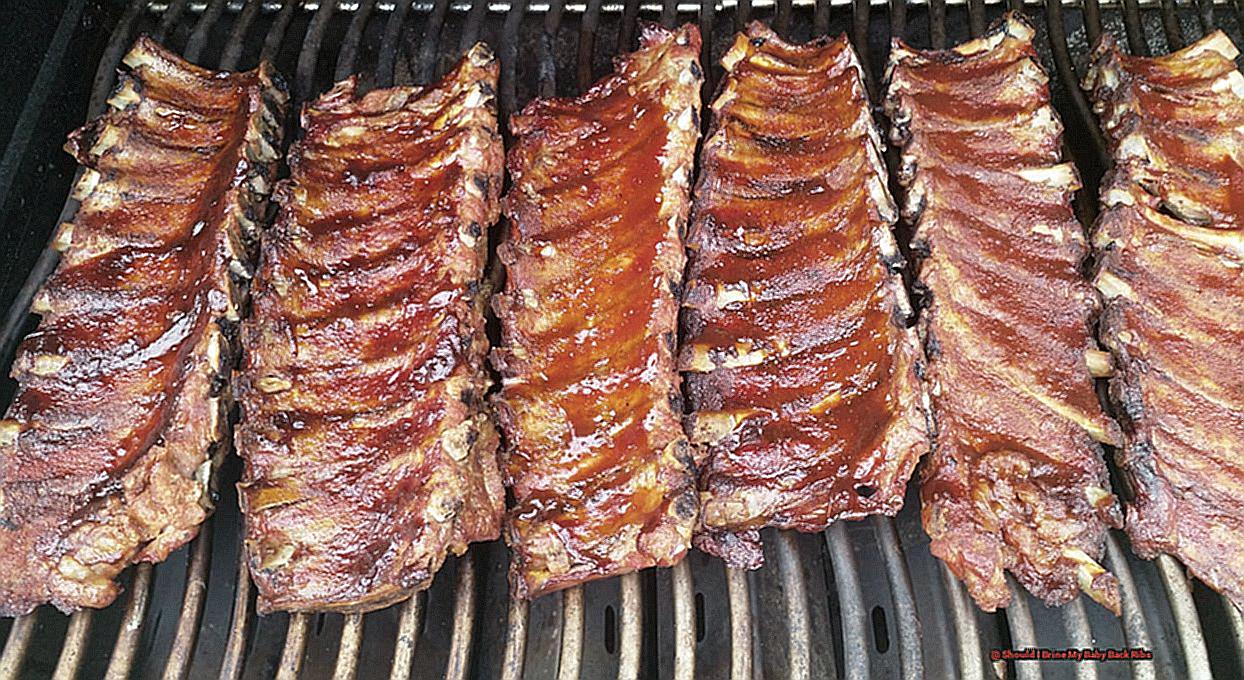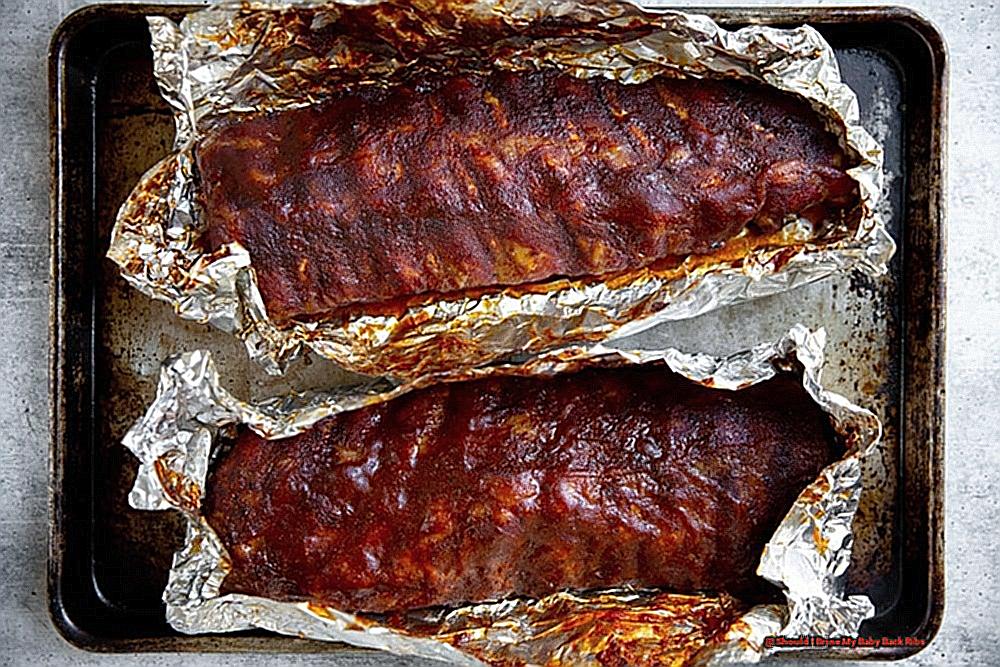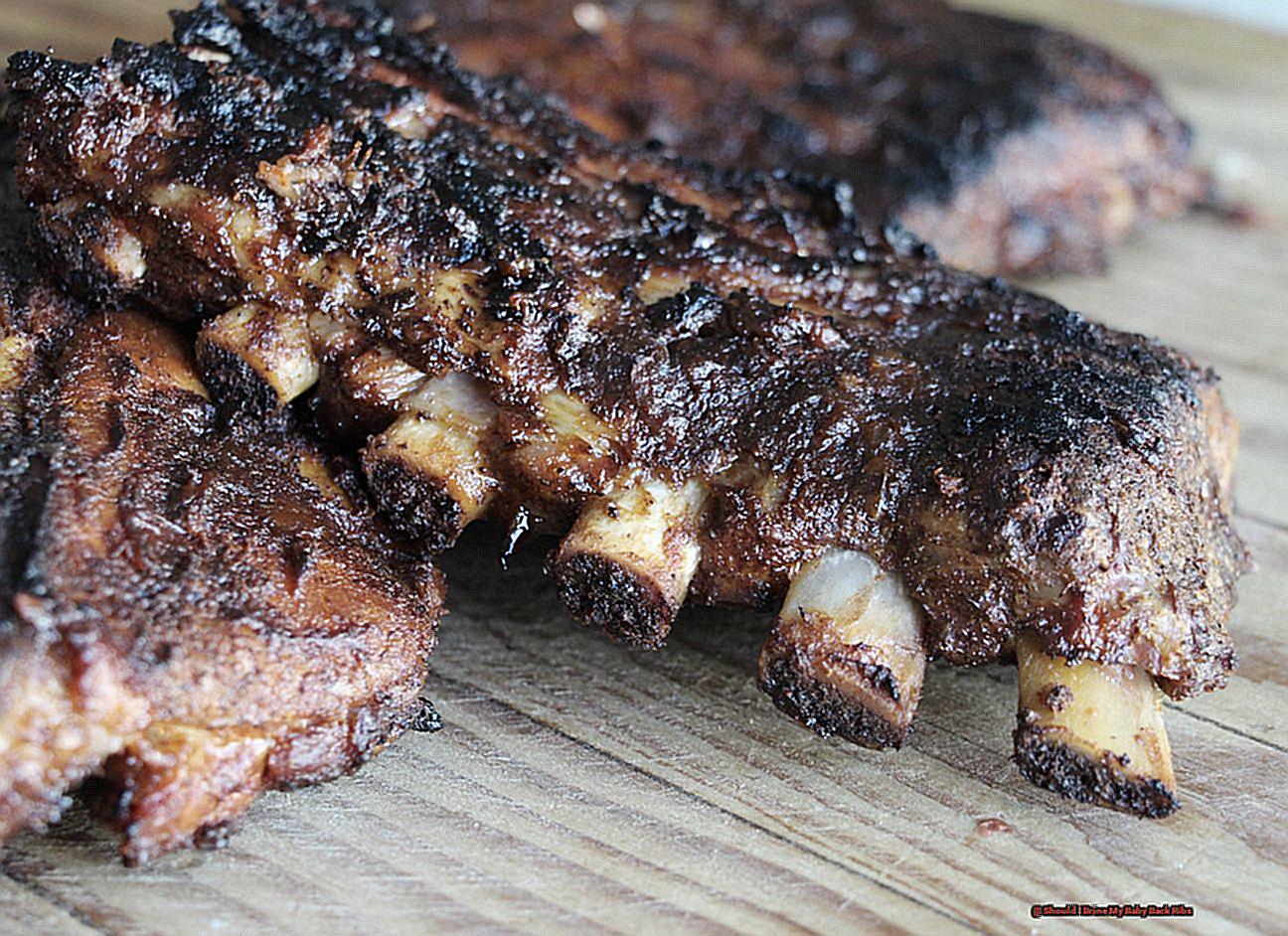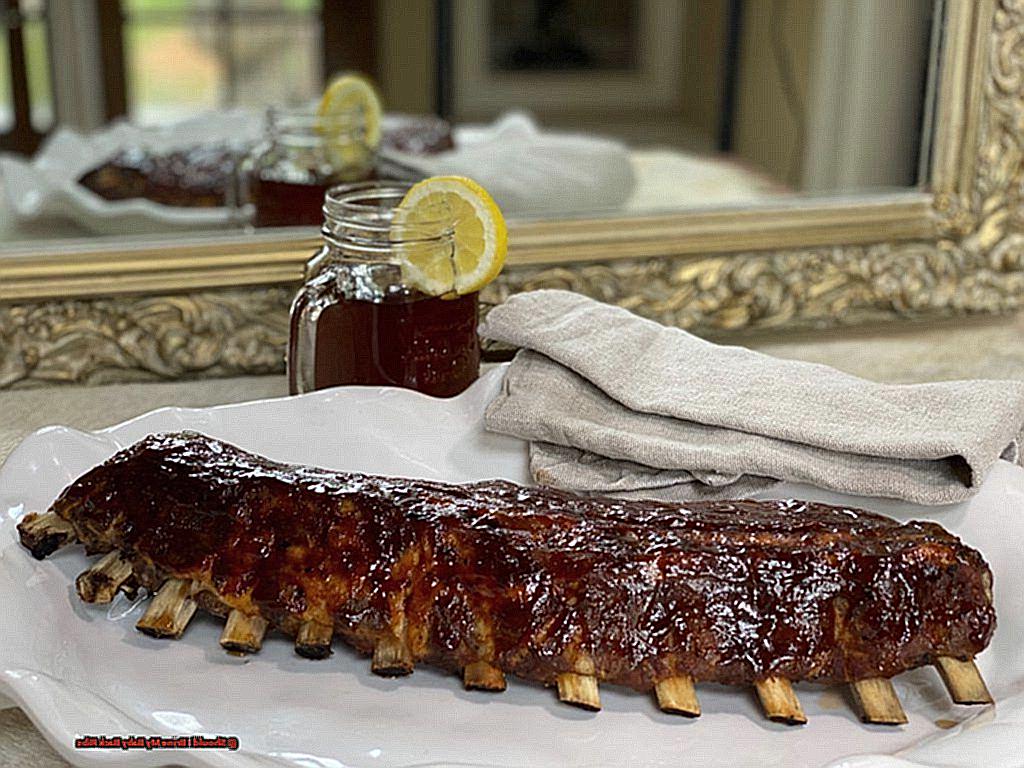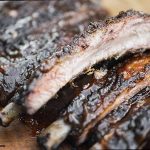Are you tired of lackluster and dry baby back ribs? Say goodbye to disappointment and hello to the game-changing technique of brining. This tried-and-true method involves soaking your ribs in a flavorful solution before cooking, resulting in juicy, tender, and mouthwatering meat that will have your taste buds singing with joy. But what exactly is brining and why should you give it a try? Let’s dive in.
Brining works wonders by infusing the meat with moisture and flavor, ensuring that your ribs stay succulent and never dry out during cooking. The salt in the brine also acts as a natural tenderizer, giving you melt-in-your-mouth texture with every bite. And here’s the best part – by adding herbs, spices, and other seasonings to the brine, you can create a customized flavor profile that suits your taste buds perfectly.
But wait, there’s more. Brining can be done ahead of time, allowing you to marinate your ribs overnight for an even more intense flavor infusion. And don’t worry about any complicated techniques or fancy equipment – brining is an easy and foolproof method that anyone can do at home.
So, next time you’re craving some lip-smacking baby back ribs, remember the amazing benefits of brining. Trust us, your taste buds will thank you for taking their experience to the next level.
Contents
What is a brine, and why should you use one for your ribs?
A brine is a solution of saltwater used to flavor and tenderize meat, particularly baby back ribs. Soaking ribs in brine helps them retain moisture during cooking, resulting in juicy and succulent meat. Brining is a simple process that involves soaking the meat in a saltwater solution for several hours or overnight.
Why is brining beneficial for your ribs?
- Moisture Retention: Brining keeps ribs moist and juicy while cooking. The salt in the brine solution prevents the meat from drying out, resulting in tender and succulent ribs.
- Flavor Enhancement: Ingredients used in the brine, such as apple cider vinegar, brown sugar, and spices, infuse into the meat during soaking, adding depth and complexity to the ribs’ flavor.
- Tenderizing: The salt in the brine breaks down the proteins in the meat, resulting in more tender and easier-to-eat ribs.
- Balancing Flavors: Acidic ingredients like apple cider vinegar balance out the flavors in the ribs, creating a well-rounded and delicious taste.
- Fall Flavors: The baby back rib brine recipe includes fall-inspired ingredients like apple cider vinegar and brown sugar, making it perfect for seasonal BBQs.
How do you make a baby back rib brine?
| Salt | 1 cup | |
| Apple Cider Vinegar | 1 cup | |
| Brown Sugar | 1/4 cup | |
| Peppercorns | 1 tsp | |
| Mustard Seeds | 1 tsp | |
| Garlic Cloves, minced | 2 cloves | |
| Bay Leaves | 2 leaves | |
| Water | 4 cups |
Directions:
In a pot, combine salt, apple cider vinegar, brown sugar, peppercorns, mustard seeds, minced garlic cloves, and bay leaves with 4 cups of water.
- Bring the mixture to a boil and let it cool.
- Once cooled, place the ribs in a large container or plastic bag and pour the brine over them.
- Make sure the ribs are fully submerged in the brine and refrigerate for at least 24 hours.
How to make our baby back rib brine recipe
Elevate your grilling game with our foolproof baby back rib brine recipe. Follow these simple steps to make a flavorful and tender brine that will take your ribs to the next level.
| Create the base brine: | In a large container, combine 2 cups of salt, 1 cup of brown sugar, and 1 gallon of water to form a solution. |
| Enhance with flavor: | To elevate the taste of your ribs, add 1 cup of apple cider vinegar, 1/4 cup of peppercorns, 1/4 cup of mustard seeds, 6 minced garlic cloves, and 4 bay leaves to the brine. |
| Immerse ribs in the brine: | Submerge the baby back ribs in the brine solution, ensuring they are fully covered. Allow them to soak in the refrigerator for 24 hours. |
| Rinse and pat dry: | After brining, remove the ribs from the solution and rinse off any excess salt. Gently pat dry with a paper towel. |
| Grill to mouth-watering perfection: | Preheat your grill to medium-low heat and place the ribs bone side down away from direct heat. Grill for 2-3 hours, basting with BBQ sauce every 30 minutes until they reach an internal temperature of 145°F. |
| Rest and indulge: | Allow the grilled ribs to rest for 10-15 minutes before cutting them into individual pieces and serving with additional BBQ sauce on the side. |
By following this brine recipe, you can achieve perfectly tender and flavorful baby back ribs that will be a hit at your next BBQ. The combination of salt, sugar, and flavorful ingredients will infuse into the meat, creating a delicious and juicy result.
Soak the ribs for 24 hours for best results, and don’t forget to baste with BBQ sauce during grilling for even more flavor. Give this brine recipe a try on other meats like pork chops or tenderloins as well.
The benefits of using a brine for your ribs
The benefits of utilizing a brine for your ribs are plentiful and varied, with notable advantages including improved moisture retention, enhanced tenderness, and increased flavor infusion. The process of brining involves submerging the ribs in a solution of saltwater, allowing for the absorption of liquid and seasoning through the processes of osmosis and diffusion. The end result is a succulent and flavorful dish that is sure to be a hit at any BBQ gathering.
One of the key perks of brining is its ability to retain moisture in the meat. By soaking the ribs in a saltwater solution, the meat absorbs both water and salt, resulting in a juicier final product. This prevents the ribs from becoming dry and tough during the grilling process, ensuring each bite is bursting with succulent tenderness.
Brining also has a significant impact on the tenderness of the meat. The presence of salt in the brine works to break down connective tissues in the ribs, resulting in a more tender and melt-in-your-mouth texture. This is especially beneficial for tougher cuts of meat such as baby back ribs.
Moreover, brining allows for an infusion of flavors into the meat. By incorporating herbs, spices, sugars, and other ingredients into the brine, you have the ability to customize the taste of your ribs to suit your preferences. This adds another layer of depth and complexity to your BBQ, taking it from good to exceptional.
Additionally, brining utilizes the processes of osmosis and diffusion to enhance not only tenderness and moisture retention but also flavor. Osmosis occurs when water moves from an area of low salt concentration (the brine) to an area of high salt concentration (the meat), resulting in the absorption of liquid and seasoning by the meat. Diffusion, on the other hand, takes place when molecules move from an area of high concentration to an area of low concentration. In this case, the flavors from the brine will diffuse into the meat, enhancing its overall taste.
Lastly, for optimal results, brining requires patience and precision. The ribs must be submerged in the brine for a specific amount of time, which can vary depending on their size and thickness. Additionally, proper grilling techniques must be followed to ensure the best flavor and texture.
How to cook your ribs using the brine recipe
Cooking your ribs to perfection doesn’t have to be complicated. With the simple and effective method of brining, you can achieve tender, juicy, and flavorful meat every time. Follow these steps and use the provided recipe to brine your ribs properly.
- Get a big pot or container and mix 1 gallon of water, 1 cup of apple cider vinegar, ½ cup of brown sugar, ½ cup of salt, 2 tablespoons of peppercorns, 2 tablespoons of mustard seeds, 4 minced garlic cloves, and 2 bay leaves together. Stir until the salt and sugar completely dissolve.
- Place your ribs in the brine solution and ensure they are fully submerged. Add more water if needed to cover the ribs.
- Cover the pot or container and refrigerate for at least 24 hours. For best results, brine for 48 hours.
- After brining, take out the ribs from the solution and rinse off any excess salt under cold running water.
- Gently pat the ribs dry with paper towels and let them sit at room temperature for around 30 minutes before grilling.
- Grill your ribs over low heat (approximately 225-250°F) for 2-3 hours using indirect heat. For an added smoky flavor, use wood chips or chunks.
- Give your ribs a rest for about 10-15 minutes after grilling to allow the juices to redistribute throughout the meat.
- Serve up and enjoy your perfectly brined baby back ribs.
Brining enhances the flavor and tenderness of baby back ribs in multiple ways. The salt in the brine draws out moisture from the meat through osmosis, which then gets reabsorbed along with the flavors from the brine. This results in a more flavorful and juicy end product.
Moreover, brining helps break down connective tissues in the meat, resulting in more tender ribs. The longer the ribs are left in the brine (typically between 4-8 hours), the more tender they will be.
Furthermore, by adding herbs, spices, and other ingredients to the brine, you can create unique flavor profiles and elevate the taste of your ribs. In this recipe, the combination of apple cider vinegar and brown sugar adds a perfect balance of sweet and tangy flavors that complement the savory taste of the meat.
Recipes featuring BBQ baby back rib brine
Brining is a culinary technique that involves immersing meat in a solution of saltwater before cooking.
This method works wonders in elevating the taste and tenderness of the meat, resulting in a more succulent and flavorful dish. For BBQ baby back ribs, brining can make all the difference in the final outcome.
Some delectable recipes featuring BBQ baby back rib brine are a basic saltwater brine, beer-based brine, buttermilk brine, and maple syrup and apple cider vinegar brine. Brining adds to the ribs’ flavor by infusing them with a blend of salt, sugar, and spices, creating a depth of taste that cannot be achieved with regular seasoning.
It also contributes to keeping the ribs juicy and tender by breaking down tough muscle fibers and allowing the flavors to penetrate.
Conclusion
In conclusion, brining is a game-changing technique that transforms lackluster baby back ribs into mouthwatering masterpieces.
By immersing the ribs in a flavorful solution before cooking, you can achieve juicy, tender, and perfectly seasoned meat that will tantalize your taste buds. The magic of brining lies in its ability to infuse moisture and flavor into the meat while also acting as a natural tenderizer.
Plus, by experimenting with different herbs, spices, and seasonings in your brine, you can create a personalized flavor profile that caters to your unique palate.

